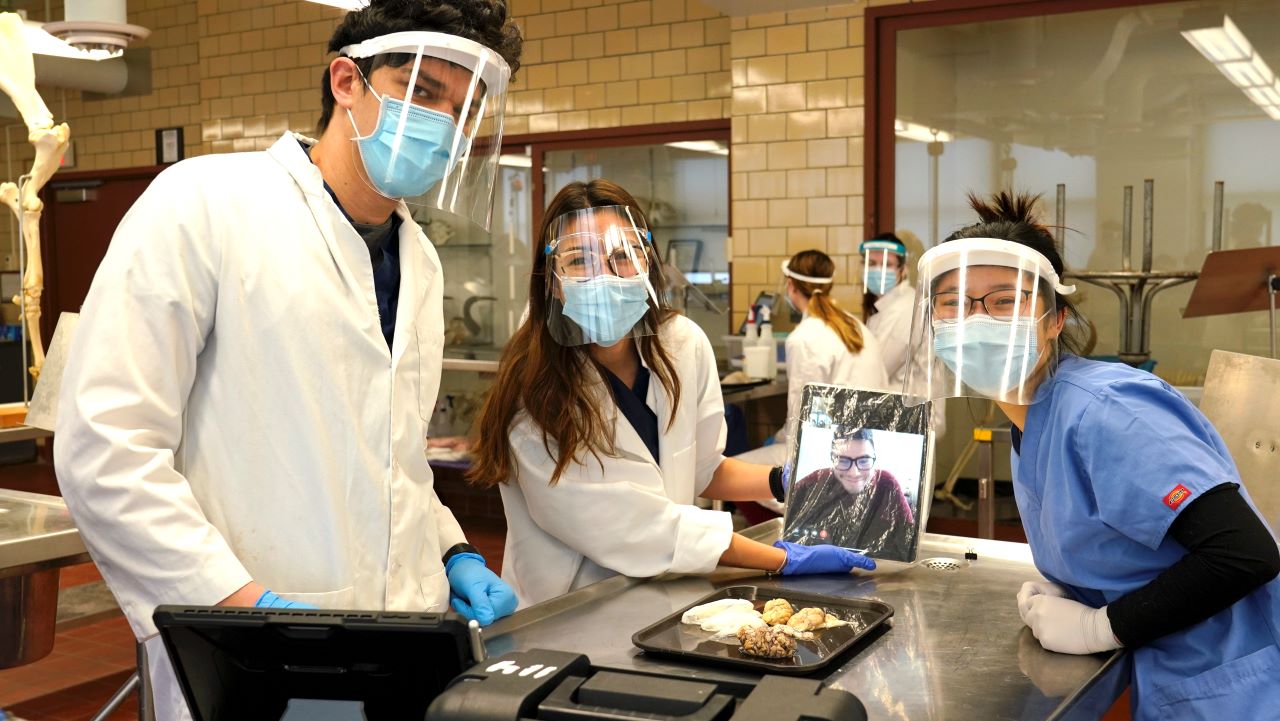Study demonstrates the advantages of S/U grades for D.V.M. students
Researchers from the Cornell University College of Veterinary Medicine (CVM) found that a satisfactory/unsatisfactory (S/U) grading system used during the early months of COVID-19 increased veterinary students’ well-being and time for self-care without sacrificing academic performance. According to their paper, published in the Journal of Veterinary Medical Education, D.V.M. students performed similarly on letter-graded and S/U coursework, offering the opportunity to consider alternative grading systems that support both students’ health and learning.
Research has shown that workplace burnout is prevalent among veterinarians, highlighting the importance of promoting well-being during training and beyond. “In our profession we have a responsibility to investigate ways to improve the lives of our D.V.M. students as they transition into their professional careers,” said study co-author and assistant clinical professor in the Department of Population Medicine and Diagnostic Sciences Ashleigh Newman ‘06.
Pandemic grading alternative offers research opportunity
After stay-at-home orders were issued in New York, Cornell temporarily offered an S/U grading system for the spring 2020 semester before returning to standard-letter grading in the fall. First author Kelly Lyboldt, D.V.M. ‘05, an associate professor of practice in the Department of Biomedical Sciences, said that professors were concerned about the impacts the rapid conversion to online courses might have on students’ stress levels and learning. The college ultimately decided to institute S/U grading for DVM students.
While pass/fail grading isn’t common in academia, human medicine programs have experimented with S/U grading since the 1960s to allay students’ anxiety. Studies showed that S/U grading positively affected students’ well-being without altering academic outcomes. Opponents have argued that alternatives to letter grades could undermine the rigor of medical training. Still, human medical students have received S/U grades on United States Medical Licensing Examinations since 2022, shifting the emphasis from numerical scores to clinical excellence and interpersonal skills.
While S/U grading has been used at other institutions, it has not been widely applied at CVM,, and thus the team took advantage of the opportunity to explore the effects of an alternative system. A cohort of veterinary students took a core course that spanned the spring and fall 2020 semesters, and faculty were able to compare the results of S/U and letter-graded classes. According to Lyboldt, the research team hypothesized that the S/U system would alleviate students’ stress over their GPAs without sacrificing motivation or academic success.
The team used academic performance data from the 2020 Foundation Course III — a two-part course on animal organ systems covering physiology, pharmacology, clinical pathology, and anatomic pathology — along with a questionnaire about students’ educational experiences and well-being during the course. While students received S/U grades for the spring 2020 course, administrative support kept track of their numerical and letter grades for both semesters, since a “Satisfactory” grade requires a final score above C –. Out of 118 students in the cohort, 68% responded to the questionnaire.

Gaining time for self-care while maintaining motivation to learn
In terms of academic performance, the grading system made little difference in students’ final numerical grades: 83.7% and 84.3% for the spring and fall 2020 semesters, respectively. Data also supported the team’s prediction that, without the pressure of achieving a particular letter grade, 95% of students reported redirecting some of their energy to achieving a healthier balance between academics and caring for their physical and mental wellbeing.
A majority of students saw S/U grading and the open-book exams that accompanied it positively.
One critique around S/U grading in educational literature involves motivation: will students still work hard if they’re not striving for a high GPA? Fortunately, students said their motivation to study was unchanged by the grading system. Around half of those who agreed that S/U grading contributed to their well-being on the survey reported improved learning and enjoyment of the material.
“A lot of us noticed our conversations with students in the spring S/U semester were drastically different than those in the fall,” said Lyboldt. “They seemed more curious about the material, and asked about content instead of points on a quiz.”
Not everyone enjoyed the temporary grading system. Almost 50% of questionnaire responders would have preferred a final letter grade in the spring 2020 class. The authors suspect that’s because grades are important for internships, and their spring 2020 grades would have enhanced their overall GPAs.

The future of S/U grading at CVM
While CVM isn’t throwing in the towel on letter grades, the college did move to S/U grading for fourth-year D.V.M. students performing clinical rotations. Foundation Course III is now hybrid, with weekly S/U quizzes and built-in reflection opportunities for graded assignments, along with a letter-graded final exam and letter for the final grade.
Eleni Casseri, M.P.H. ’19, D.V.M. ’24, took a hybrid version of Foundation Course III. “The pass/fail grading on the quizzes took a lot of pressure off me,” she said. “It wasn’t about whether I got 80% or 85%; it was about learning material because I’m going to be a doctor someday. I felt like I wasn’t just trying to pass another class.”
The research team also believes that S/U grading allows students the space for low-stakes failures and learning resilience. “Our veterinary students are very intelligent and motivated individuals,” said Kathryn D. Bach ‘04, M.S. ‘09, Ph.D. ‘19, paper co-author and lecturer in the Department of Population Medicine and Diagnostic Sciences. “We want them to focus on growing after their mistakes instead of stressing about impacts to their GPAs.”
Antonia Jameson Jordan, D.V.M. ‘99, Ph.D. ’08, is a senior lecturer in the Department of Biomedical Sciences and paper co-author who sees S/U grades within a larger context. “Our students have been pushing for years for the college to support their wellness,” she explained. “It’s great to find systems that support students’ learning, health, and ability to be great veterinarians.”
As CVM continues to examine and refine its curriculum, these findings will help in establishing approaches that optimize long-term learning and healthy habits for sustaining a lifetime of career satisfaction in veterinary medicine.
Written by Jennifer DeMoss






